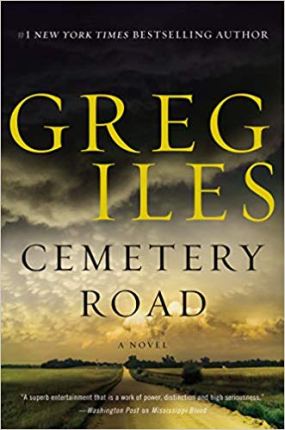
Greg Iles and Mississippi go together like meat and potatoes. In the same way that James Lee Burke is known for writing about Louisiana or how C.J. Box is synonymous with Wyoming, Iles brings the Mississippi setting to life in ways that few others could. That’s especially true with his latest novel, Cemetery Road, one of his most riveting stories yet.
Marshall McEwan left his hometown of Bienville, Mississippi at 18 years old and never looked back. Having grown up the son of a small-time reporter who continued running the family business, a local newspaper, Marshall set his sights on Washington D.C., big stories that mattered, and reached for the sky. Now, having conquered the nation’s capital on his way to becoming one of the most trusted national reporters in the business, his life takes an unexpected turn when his mother informs him that his father is ill and unable to continue running the newspaper.
Though he’s initially reluctant, Marshall does eventually move home and, in an effort to jumpstart the failing newspaper, goes looking for stories. In an ironic twist, Marshall discovers that the biggest story of his career is right there in Bienville, one that reaches all the way to D.C. and may implicate a number of powerful people . . . but to report on it, he’ll have to figure out how to stay alive long enough to gather the facts and get to the bottom of things before it’s too late.
Ahead of the release of Cemetery Road, Greg Iles agreed to go on the record for our Five Questions segment, and I asked him about this book, how he came up with the story idea, and what’s next for him. Read the full Q&A below, then click here to order your copy of Cemetery Road today.

TRBS: What an incredible, unforgettable novel. Cemetery Road is, I think, some of your best work to date. How did you come up with the plot details for this book?
Iles: Cemetery Road actually grew out of the shocking secret revealed at the novel’s conclusion. The plot details involving small-town corruption I learned by growing up and living in Mississippi. The journalism details I picked up by classic research that writers do for every novel. A cautionary note for writers: you rarely include more than one percent of what you learn during research, despite all temptations to the contrary.
TRBS: While the setting is one you’ve written about before, how much research did you have to do before actually sitting down to write this one?
Iles: Research isn’t what slowed me down on this novel. The real work comes in integrating the characters and details with the underlying psychological journeys you were trying to portray. For me, that’s a distillation process that happens while I’m doing things other than writing. As for your question, readers should follow Stephen King’s advice regarding research, and never let it hold up the writing of the story. Just put in any name or term to get you to the next sentence, then come back and fix it later. An exception would be The Martian by Andy Weir, which is almost a function of the research.
TRBS: What is your writing process like, do you outline your books ahead of time, have a target word count you try to hit each day? And what advice do you have for new or aspiring authors?
Iles: I generally do not outline. I don’t even begin until the novel is bursting to get out. Once I do, I work up to eighteen hours a day, and it’s not unusual for me to write five or six thousand words for days or sustained periods. I work almost exclusively at night, not stopping until after dawn. It’s a highly efficient process, but I don’t recommend it. It’s very hard on your family and your health.
TRBS: Who are some of your favorite authors, and what is the last great book that you read?
Iles: I’ve been reading a lot of nonfiction lately, primarily for research. I tend to re-read fiction I love rather than find new novels. It’s harder for me to find things I like. Anyone who hasn’t read Patrick O’Brien’s Aubrey/Maturin novels should begin immediately. Same with John D. McDonald – not only his Travis McGee books, but also his standalones.
TRBS: Lastly, now that Cemetery Road is set to come out, what’s next for you?
Iles: I’m working on at least three other things. I don’t want to give away what they are, but they are all very different from each other. There is one more Penn Cage novel to come. A lot of readers were unhappy with where Penn’s father ended up at the end of the last novel. So that will come, but it’s unlikely to be the next novel.
Praised as “one of today’s finest book reviewers” by New York Times bestselling author Gayle Lynds, Ryan Steck (“The Godfather of the thriller genre” — Ben Coes) has “quickly established himself as the authority on mysteries and thrillers” (Author A.J. Tata). Steck also works full-time as a freelance editor and pens a monthly thriller column for CrimeReads. For more information, be sure to follow him on Twitter and Facebook. He currently lives in Southwest Michigan with his wife and their six children.
